The new project is named neurAM, which stands for Neuromorphic materials designed atom by atom and the research team are Dr. Susanne Baumann (Institute for Functional Matter and Quantum Technologies (FMQ) of the University of Stuttgart), Dr. Hermann Osterhage (Institute for Molecules and Materials (IMM) of Radboud University) and Dr. Eduardo Domínguez Vázquez (Donders Institute for Brain, Cognition and Behaviour of Radboud University). They combine their expertise in the different research fields of single atoms and their magnetic dynamics, with machine learning, to bring this project to fruition.
The human brain can perform many cognitive tasks with a much higher efficiency than computers can. Additionally, modern-day technology adds increasing demand on state-of-the-art computers and with the growing importance of for example pattern recognition tasks, our modern-day computers are expected to soon hit a bottle-neck. Thus, new solutions need be developed that allow for more efficient computing architectures. Neuromorphic computing offers new pathways towards this end by trying to mimic brain-like functions in hardware implementations.
Within the neurAM project, the scientist want to create new materials with inherent properties resembling the neuronal structure of the brain: namely materials with plasticity, that are self-adaptive. The researchers will study the interactions between atoms in two-dimensional arrays using scanning tunneling microscopy, where they search for configurations of interacting atoms that can be used to perform specific computational tasks.
Dr. Baumann explains: “Machine learning algorithms are already, in their way of functioning, based on our brain. Yet, conventional hardware is not capable to implement the potentials of those algorithms to their full potential. We need hardware technology which is more similar to the brain. Neuromorphic materials will be key in this respect.”
See as well here: Mehr Gehirn für Hardware und Software | News | 02.08.2023 | Universität Stuttgart (uni-stuttgart.de)
Dr. Baumann is currently looking for PhD candidates to join her and the team on the project.



